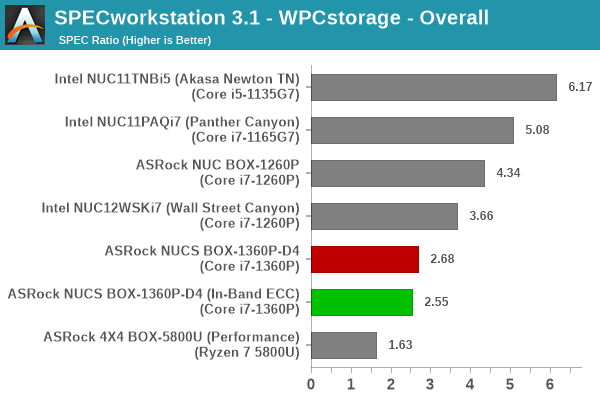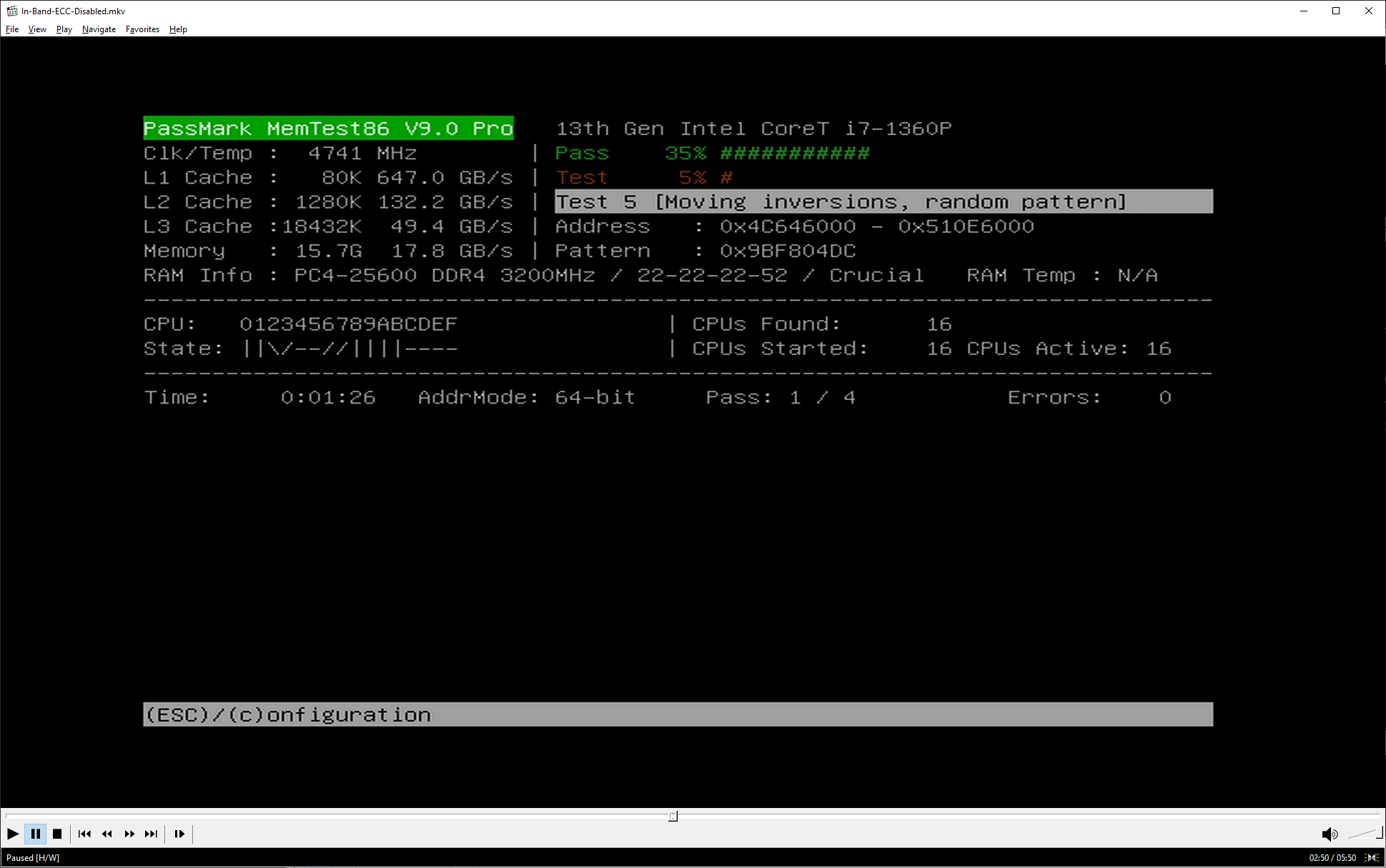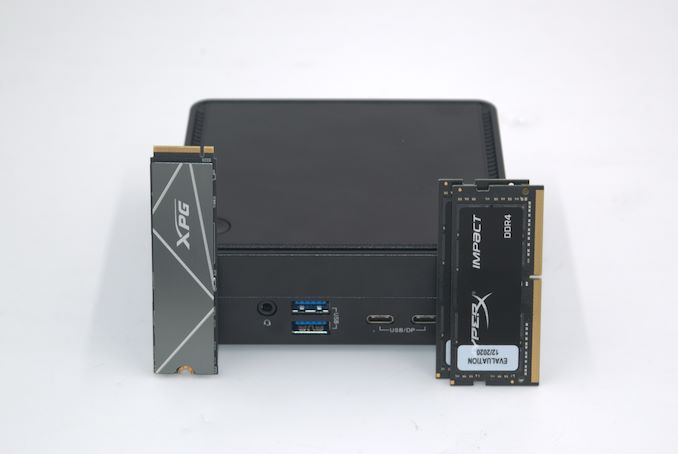ASRock Industrial NUCS BOX-1360P/D4 Review: Raptor Lake-P Impresses, plus Surprise ECC
by Ganesh T S on January 29, 2023 9:30 AM EST- Posted in
- Systems
- NUC
- UCFF
- Mini-PC
- ASRock Industrial
- Raptor Lake-P
Miscellaneous Aspects and Concluding Remarks
Networking and storage are aspects that may be of vital importance in specific PC use-cases. The ASRock NUCS BOX-1360P/D4 comes with the Wi-Fi 6E AX210 WLAN card that also include Bluetooth 5.2 support. On the wired front, we have a 2.5 Gbps port backed by the Intel I226-LM controller. A dual LAN option in this form-factor would have been nice to have, but consumers needing that can always go in for the full-height NUC BOX-1360P/D4. Strangely, the vPro support available in the NUC BOX-1260P seems to be absent here.
On the storage side, the NUCS BOX-1360P does have support for a PCIe 4.0 x4 NVMe SSDs (and we used one in our configuration). However, cooling those within the space constraints imposed by the form-factor of the slim NUC is very challenging, as we saw in the SSD temperature graph in the previous section. In the absence of an effective thermal solution, it might be a better option to stick with a PCIe 3.0 x4 NVMe SSD for this unit. From a benchmarking perspective, we provide results from the WPCstorage test of SPECworkstation 3.1. This benchmark replays access traces from various programs used in different verticals and compares the score against the one obtained with a 2017 SanDisk 512GB SATA SSD in the SPECworkstation 3.1 reference system.
| SPECworkstation 3.1.0 - WPCstorage SPEC Ratio Scores | |||

The graphs above present results for different verticals, as grouped by SPECworkstation 3.1. The storage workload consists of 60 subtests. Access traces from CFD solvers and programs such as Catia, Creo, and Soidworks come under 'Product Development'. Storage access traces from the NAMD and LAMMPS molecular dynamics simulator are under the 'Life Sciences' category. 'General Operations' includes access traces from 7-Zip and Mozilla programs. The 'Energy' category replays traces from the energy-02 SPECviewperf workload. The 'Media and Entertainment' vertical includes Handbrake, Maya, and 3dsmax. The gulf between the same SSD in the NUC BOX-1260P and the NUCS BOX-1360P would have been surprising if not for the fact that the new form-factor lacks airflow and cooling support for the SSD.
In pursuit of more investigation into the in-band ECC feature, I dug up one of the DDR4 SODIMMs that I had junked earlier for failing MemTest. Placing that in the system and running MemTest again on it delivered interesting results based on the chosen in-band ECC option. The following screenshots are from the display output recorded via a HDMI capture card - the timestamps in the video capture are to be noted.
| PassMark MemTest Processing on Faulty SODIMM | |||

With the default settings (in-band ECC turned off), the memory test reports failure in due course. On the other hand, with in-band ECC activated, MemTest ends up hanging - most likely after encountering the first memory error (before the testing program can get access to the faulty read data, the memory / ECC handling controller has detected uncorrectable errors and triggered an interrupt - which MemTest is probably unable to handle).
It appears that the in-band ECC has been present since Tiger Lake in a variety of processors. While its availability in the embedded processors line is clearly advertised on ark (example), its presence in the desktop (12th Gen. / 13th Gen.) and mobile (PDF) product line is buried under layers of documentation and not advertised widely. The murky aspect here is that error correction with standard DRAM is specified to be supported only in Chrome systems. It is not clear what is specific to Chrome (and not available or implementable in Windows and Linux) that enables it to take advantage of the in-band ECC feature. This is perhaps something worthy of follow-up by the open-source community, as the feature is of considerable interest to NAS operating systems.
Closing Thoughts
The ASRock NUCS BOX-1360P/D4 provided us with the opportunity to evaluate one of the first end products based on Intel's latest Raptor Lake-P platform. The product fulfills all our basic expectations from ASRock Industrial - we have seen that their UCFF systems run in a stable manner and provide good performance without much of an attempt at overall power consumption optimization. That trend continues with the NUCS BOX-1360P/D4. This approach has allowed ASRock Industrial to attract early adopters, and at the same time also target use-cases where the idle power consumption aspect is not much of a concern. The NUCS BOX-1360P/D4 is a worthy upgrade to the NUC BOX-1260P in terms of performance. On the I/O front, the trifurcation of the product line by ASRock Industrial has resulted in the need to wait for the other NUC BOX-1300 models if dual LAN and USB 3.2 Gen 2x2 capabilities are desired. Compared to their previous UCFF systems, the NUCS BOX-1300 series has a reduced height, and this does affect the thermal situation of the M.2 SSD. Hopefully, ASRock Industrial can address this with a solution similar to the one employed by Intel in their slim NUC kits.
Intel's Raptor Lake-P is quite close to Alder Lake-P architecturally. The core counts, cache sizes, and heterogeneous combinations are pretty much equivalent. Under such circumstances, it is indeed surprising that just process advancements have enabled Raptor Lake-P to provide satisfactory improvements in performance as well as power efficiency over Alder Lake-P. We are able to reach this conclusion despite evaluating a system that has not yet been optimized for power based on the energy consumption numbers for key UCFF PC workloads. A comparison of the power consumption profile of the NUC BOX-1260P and the equivalent Wall Street Canyon NUC shows that ASRock Industrial leaves plenty on the table for further optimization.
The expected generational improvements aside, it is heartening to see in-band ECC support getting more visibility. The ability to improve upon memory integrity without having to spring for special types of RAM or additional board area / traces can be a major selling point in a variety of consumer applications also. We are hopeful that Intel will not restrict it to industrial and embedded SKUs alone. On Raptor Lake-P specifically, we hope Intel will help enable it on operating systems beyond just Chrome OS. Obviously, there is no free lunch, and we do see some loss in performance for specific workloads (such as ones involving heavy iGPU activity). In situations requiring memory protection, the delta is not big enough to be a deal-breaker.
ASRock Industrial plans to market the NUCS BOX-1360P/D4 at a price point similar to the NUC BOX-1260P - $700 (Update: USD 691 at launch on February 7, 2023). Given the performance improvements over the previous generation NUC BOX-1260P as well as other UCFF systems, and the new features enabled in Raptor Lake-P, the pricing is justified. We look forward to the company optimizing the BIOS to address the idle power consumption issue, and tag on an appropriate thermal solution for the M.2 SSD. Those minor quibbles aside, the product is on completely solid ground in terms of both price and performance.











30 Comments
View All Comments
AntonErtl - Saturday, February 4, 2023 - link
Given that ECC error reports are extremely rare on our systems (with typically 128GB of RAM), I don't worry about having more than one error in 512 bits. Even when a DIMM failed, it resulted in 19 ECC errors (18 uncorrectable) in 14 hours, probably noticed by scrubbing (regular walks through memory to detect whether a bit has flipped).HideOut - Sunday, January 29, 2023 - link
You linked the wrong item for barebones. You linked the old model.ganeshts - Monday, January 30, 2023 - link
Yes, the target page will get updated with the additional new model once Newegg is ready to sell them (as per the info I have from ASRock Industrial). If the URL changes, I will update it. For now, the system has just started entering the channel and is not available for end-user purchase yet.GhostOfAnand - Monday, January 30, 2023 - link
Good work, G-man. I liked the expose on this in-band ECC business. Discussion here: https://www.realworldtech.com/forum/?threadid=2104...notR1CH - Tuesday, January 31, 2023 - link
I would love to see some video tests at non-standard resolutions like "5K" (5120x2160). I have a couple of kiosks that run weird display resolutions and would love to use a NUC to power them, but with the official specs only going up to 4K I've not wanted to risk it not working.abufrejoval - Saturday, February 4, 2023 - link
Well, it stands to reason that the in-band ECC option would be physically available on all recent SoCs, because nobody can resist maximizing cut & paste IP blocks.But with Intel NUCs, there is literally no chance whatsoever they'd support that on non-industrial SKUs, because it's a chance to charge double.
So I wonder if they won't force OEMs to disable that 'rogue' feature, much like AES512 or some of the recent BLK overclocking gimmicks.
I don't even mind paying an ECC premium on hardware I run 24x7, because in those cases compromised data would cost much more. But you can't buy "ECC-variants" of common NUCs and recently even buying ECC variant mainboards of classical desktop chipsets e.g. W680 has become next to impossible, when that was relatively easy say in Haswell times.
Don't know if it's because it's too niche or if Intel is somehow actively discouraging that market. AMD came to rescue until it went with DDR5, where ECC variants were "unobtainium".
All I can say is that I'd be happy to throw €100 at the ability to activate in-band ECC for any SoC that phyiscally supports it, even in a notebook that might get recycled as a server after it's no longer fit for the roadtrips.
AntonErtl - Saturday, February 4, 2023 - link
W680 boards are available in Germany and Austria, but they are expensive (>EUR 440).DDR5 UDIMMs with ECC are available in Germany and Austria from Kingston at ~EUR 210 for a 32GB UDIMM. Note that unlike for AM4, Asrock apparently no longer supports ECC with AM5, currently leaving ASUS as only supplyer for those of us who want ECC. At least AMD officially supports ECC in all socketed Ryzen 7000 CPUs up to now.
mode_13h - Tuesday, February 14, 2023 - link
> Asrock apparently no longer supports ECC with AM5Even ASRock Rack? They've announced AM5 boards, but I'm not sure if they're yet shipping.
AntonErtl - Wednesday, March 1, 2023 - link
There are no Asrock Rack AM5 boards listed on geizhals.at yet, so those may or may not support ECC when they become available.If this is an attempt by Asrock to get us to buy the more expensive Asrock Rack boards, it will fail: We will just buy ASUS.
mode_13h - Sunday, March 5, 2023 - link
BTW, the only ECC DDR5 UDIMMs I'm seeing are all DDR5-4800. I think it'll be a while before we see anything much faster.This could be a point in favor of in-band ECC, if only support for it would be more widespread.